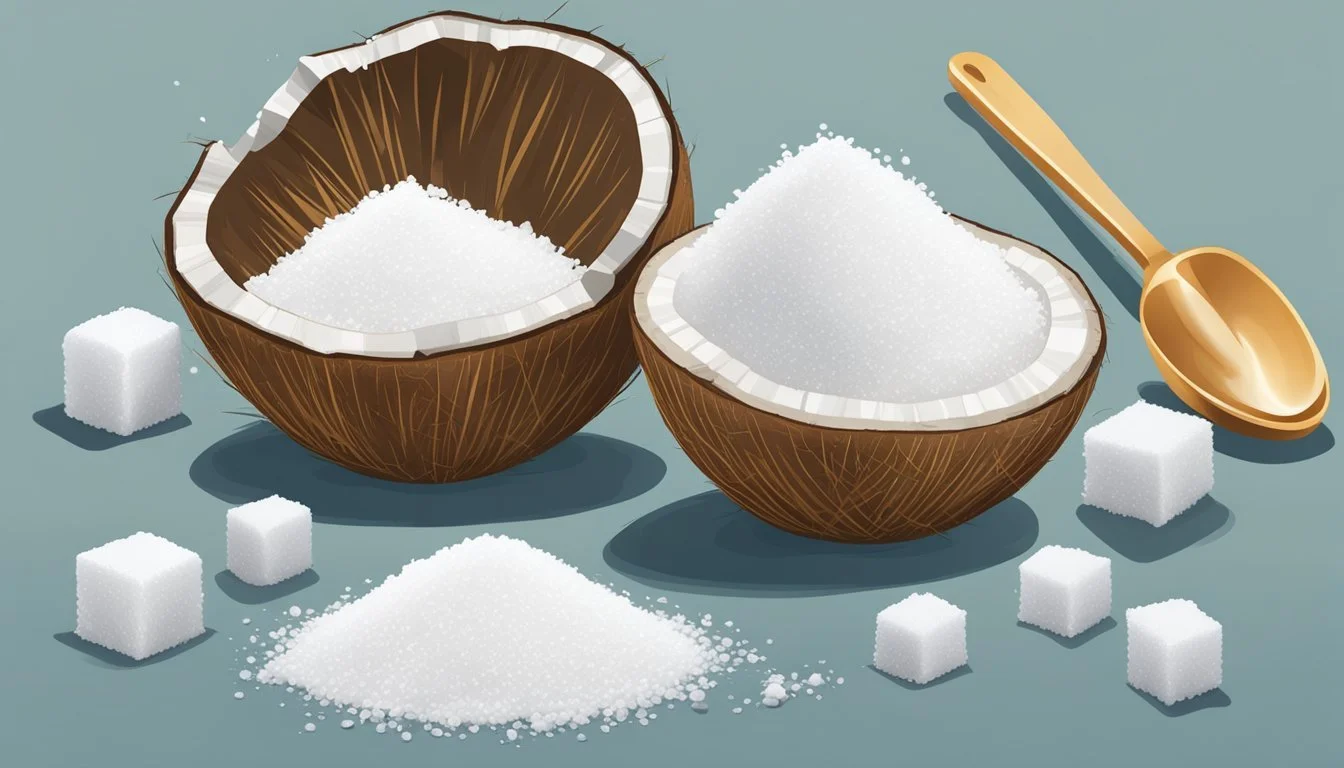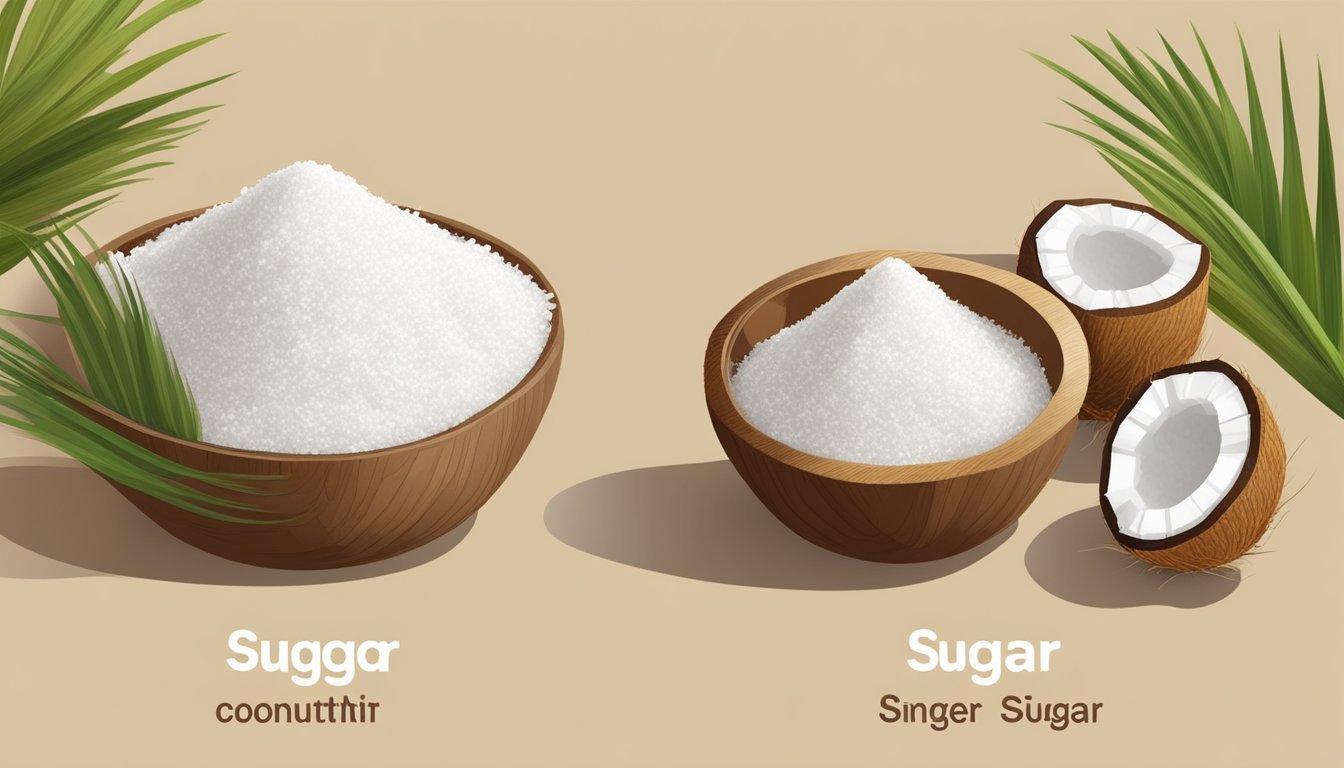Is Coconut Sugar a Healthier Alternative to White Sugar?
Exploring the Facts
Coconut sugar has gained popularity as a perceived healthier alternative to white sugar. Made from the sap of the coconut palm, it contains trace amounts of vitamins and minerals such as iron, zinc, calcium, and potassium, which are absent in white sugar. Coconut sugar also includes inulin, a type of soluble fiber that may help slow glucose absorption, offering a slightly lower glycemic index (GI) of 54, compared to white sugar's GI of around 60. This means it could cause a comparatively less immediate spike in blood sugar levels, a point of interest for those managing their blood glucose.
However, nutrition experts caution against deeming coconut sugar a superfood or a dramatically healthier option. In terms of calorie content and carbohydrate composition, coconut sugar is very similar to white sugar, with both consisting primarily of sucrose. The slight nutritional advantage of coconut sugar may not be significant enough to impact overall health, especially when consumed in the quantities typically used for sweetening. It's also important to note that any type of added sugar should be consumed in moderation within a balanced diet to maintain health and prevent potential adverse effects related to excess sugar intake.
Nutritional Comparison of Coconut Sugar and White Sugar
In evaluating whether coconut sugar is a healthier alternative to white sugar, it's important to consider their nutritional facts, vitamin and mineral content, as well as their effects on blood sugar levels.
Caloric and Carbohydrate Content
Both coconut sugar and white sugar provide approximately 15 calories per teaspoon. They are both composed primarily of carbohydrates, with coconut sugar containing around 4 grams of carbohydrates per teaspoon, which is almost identical to the amount found in white sugar. Despite minimal differences in calorie and carbohydrate content, coconut sugar is often highlighted for its less refined nature.
Vitamin and Mineral Content
Unlike white sugar, coconut sugar retains trace amounts of vitamins and minerals. However, these amounts are not significant enough to contribute to daily nutritional needs. Coconut sugar contains small amounts of nutrients such as zinc, iron, calcium, and potassium. There may be traces of magnesium as well. White sugar, on the other hand, is devoid of vitamins and minerals due to the refining process.
Glycemic Index and Blood Sugar Impact
The Glycemic Index (GI) of coconut sugar is slightly lower (approximately 54) compared to white sugar's GI, which is around 60. This means that coconut sugar causes a marginally slower rise in blood sugar levels compared to white sugar. It's important to note that both can lead to blood sugar spikes if consumed in large quantities. The fiber content in coconut sugar, attributed to the presence of inulin, may also play a role in moderating blood sugar levels, though this effect is relatively minor.
Health Implications
Deciphering the health implications of coconut sugar in comparison to white sugar involves examining its effects on diabetes management, cardiovascular health, and the potential benefits derived from its nutritional constituents.
Impacts on Diabetes and Blood Sugar Management
Coconut sugar boasts a glycemic index (GI) of 54, slightly lower than table sugar's GI of around 60. This metric is pivotal for those managing diabetes, as foods with lower GI values raise blood sugar levels more gradually. However, it is essential to remember that coconut sugar is still a form of sugar and should be consumed in moderation.
Cardiovascular and Chronic Disease Considerations
While no direct connection has been established between coconut sugar consumption and a reduced risk of heart disease or other chronic conditions, the choice of sweetener can play a minor role in an overall healthy diet. Fat content in coconut sugar is negligible, making it similar to other sugars in terms of cardiovascular implications.
Potential Benefits from Prebiotic Fiber and Phytonutrients
Coconut sugar contains inulin, a type of prebiotic fiber, which could be beneficial for gut health and may contribute to lower blood sugar spikes. Additionally, its content of certain phytonutrients with antioxidant properties may provide marginal health advantages, although the exact impact on chronic diseases warrants further research.
Environmental and Social Impact
When considering coconut sugar as an alternative sweetener, its environmental and sustainability factors come into play, along with its economic implications.
Sustainability of Coconut Sugar Production
Coconut sugar is derived from the sap of the coconut palm tree, which offers certain ecological benefits. These trees are known for their efficiency in sugar production; they yield more sugar per acre than sugarcane—up to 50-75% more—while utilizing less water and soil nutrients. The cultivation of coconut palms can contribute to soil restoration, especially in areas with damaged ecosystems. The process requires minimal water, making it an environmentally sustainable crop.
Economic Factors and Price Comparison
The price of coconut sugar is often higher than that of white sugar. This can be attributed to its production process, which is more labor-intensive, and the fact that it is often marketed as an organic product. Despite the higher price, the demand for coconut sugar has grown, in part due to its perceived health benefits and lesser environmental impact. This increased demand can offer economic opportunities for farmers in coconut-producing regions, although it does not always translate into substantially higher incomes due to the layers of trade and distribution involved.
Usage in Cooking and Baking
When it comes to cooking and baking, coconut sugar is increasingly popular as a sugar substitute. Its unique taste profile allows it to blend into a wide range of recipes, and it offers a straightforward substitution ratio for traditional sweeteners.
Taste Profile and Culinary Applications
Coconut sugar is known for its rich caramel-like flavor which makes it ideal for baked goods requiring a deep, molasses-like taste. Unlike refined white sugar that simply provides sweetness, coconut sugar can enhance the flavor complexity of desserts. Chefs and home bakers often use coconut sugar in recipes, where the rich color can contribute to the aesthetic appeal of dishes such as cookies, cakes, and sauces. Here is a table of culinary applications where coconut sugar is an effective substitute:
Baked Goods Sauces and Glazes Beverage Sweetener Cookies Barbecue sauce Coffee Brownies Caramel drizzle Tea Cakes Stir-fry sauce Smoothies Muffins and Breads Marinades Cocktails
Substitution Ratios and Texture Considerations
For most baking purposes, coconut sugar can be substituted for white sugar at a 1:1 ratio. This means if a recipe calls for one cup of white sugar, one can simply use one cup of coconut sugar as a direct substitute. The granules of coconut sugar are similar in size to that of brown and white sugar, which aids in maintaining the texture in recipes. It should be noted, though, that the moisture content of coconut sugar can be slightly higher, which might slightly alter the texture of certain baked goods. Adjustments to baking temperatures or times may be necessary to achieve the desired outcome. For example:
Cookies: May result in a chewier texture due to moisture retention.
Cakes: Can cause denser crumb structure; consider pairing with baking powder to maintain lift.
Crispies and Meringues: Might not be as crisp due to the moisture content; close monitoring of oven temperature is advised.
Careful consideration of the moisture and flavor profiles when substituting coconut sugar will help bakers achieve optimal results in their sweet creations.
Comparison with Other Sweeteners
In assessing the health impact of various sweeteners, the primary considerations are their nutritional content and suitability for specific dietary needs.
Nutritional Differences Among Various Sugars and Sweeteners
Sweeteners can vary widely in their nutritional profiles, affecting their suitability as sugar alternatives. Table sugar, or sucrose, is a refined, high-calorie sweetener devoid of additional nutrients. In contrast, coconut sugar contains small amounts of nutrients like zinc and iron and inulin, a fiber that may slow glucose absorption.
Natural sweeteners such as honey and maple syrup provide trace nutrients that table sugar does not. However, like high fructose corn syrup (HFCS), these also contain high levels of fructose, which can be harmful in excessive amounts. Agave nectar, often praised for its low glycemic impact, is considerably high in fructose.
Sweeteners such as stevia, monk fruit, and sucanat (dehydrated cane juice) offer sweetness without the added calories, making them suitable for individuals looking to reduce their overall caloric intake.
Here's a breakdown of some key differences:
Sweetener Calories (per teaspoon) Fructose Content Notable Nutrients Table sugar 16 50% None Coconut sugar 15 Low Iron, Zinc, Inulin Honey 21 Varies Trace minerals Maple syrup 17 Low Antioxidants, minerals Stevia 0 0% None Agave nectar 20 80%+ None
Assessing Sugar Alternatives for Specific Dietary Needs
For individuals managing diabetes, alternatives with lower glycemic indexes, such as stevia or coconut sugar, can be preferable to conventional sugars that cause spikes in blood glucose levels. However, carbohydrate content and overall diet must be considered.
Vegan diets benefit from plant-based sweeteners like agave syrup, maple syrup, and coconut sugar. These not only align with vegan ethics but also can provide diverse flavors for vegan baking and cooking.
Concerns about heart disease mean steering clear of excessive added sugars, including natural sweeteners and alternatives. Substances like molasses or date sugar are better in moderation, as they still contribute to the overall sugar intake.
People seeking healthy alternatives often turn to sweeteners like stevia or monk fruit for their non-caloric nature, or brown sugar and molasses for their mineral content, though the latter two still contribute calories and can impact blood sugar levels.
In conclusion, while alternatives like coconut sugar offer some advantages over refined sugars in terms of nutrients, it’s important to use all sweeteners sparingly to reduce the risk of diseases associated with high sugar intake.
Labeling and Availability
This section discusses the importance of accurate labeling for sugar content in foods, and the availability of coconut sugar in various markets, focusing on how consumers can distinguish and procure this sweetener.
Understanding Food Labels and Sugar Content
Food labels can often be the consumer's primary source of information about sugar content. Coconut sugar, like other sweeteners, should clearly state its contents on the label, including any added sugars and whether it is refined or unrefined. Coconut sugar is typically less processed than white table sugar and retains some of the natural elements of the sap it's derived from.
Labels should indicate if the coconut sugar is organic or has undergone minimal processing, which can be an essential factor for consumers looking to limit their intake of refined sugars. Coconut sugar's nutritional profile is often compared to that of regular cane sugar, as they share similar calorie and carbohydrate content per teaspoon. However, it is sometimes marketed as a more natural sugar due to the presence of inulin, which may help manage sugar absorption.
Access to Coconut Sugar in Different Markets
Coconut sugar, also referred to as coconut crystals, has been gaining popularity as a perceived healthier sweetener and can be found in a variety of marketplaces:
Health food stores: Often have a large selection of sweeteners, including organic and raw varieties of coconut sugar.
Supermarkets: More supermarkets are stocking coconut sugar alongside regular table sugar due to consumer demand.
Online retailers: Offer a broad range of coconut sugar products, with the convenience of comparing brands and prices.
While availability has increased, coconut sugar might still be less accessible or more expensive than regular table sugar, reflecting the more labor-intensive production process compared to conventional cane sugar.
Conclusion
Coconut sugar is often presented as a natural sweetener that can serve as a direct substitute for white sugar. With a lower glycemic index (GI), typically around 54 compared to white sugar's 60, it induces a less immediate spike in blood sugar levels. However, it’s important to acknowledge that coconut sugar's GI is still relatively high, and it should be consumed in moderation, just like white sugar.
Nutritionally, coconut sugar contains trace amounts of vitamins and minerals like iron, zinc, calcium, and potassium, which white sugar lacks. It also includes inulin, a type of soluble fiber known to slow glucose absorption. Despite these differences, the caloric content of coconut sugar is comparable to white sugar—both contain approximately 18 calories per teaspoon.
Given its constituents, coconut sugar may be slightly preferable to white sugar regarding its impact on blood sugar levels and nutrient content. However, they both contribute to calorie intake, and excessive consumption of either can lead to health issues such as obesity, heart disease, and type 2 diabetes. Consumers should focus on overall dietary patterns rather than relying on singular sugar alternatives as a health solution.
It is advisable to use coconut sugar sparingly and to stay informed about daily sugar intake recommendations. Health experts agree that reducing overall sugar consumption is key to maintaining a balanced diet and a healthy lifestyle.




